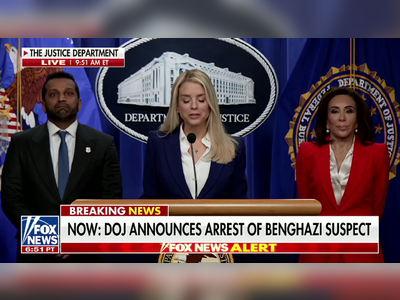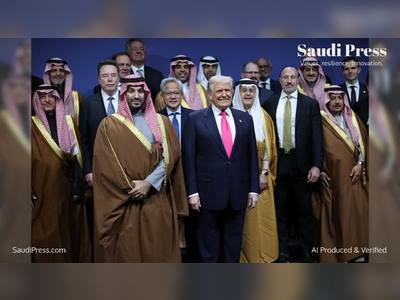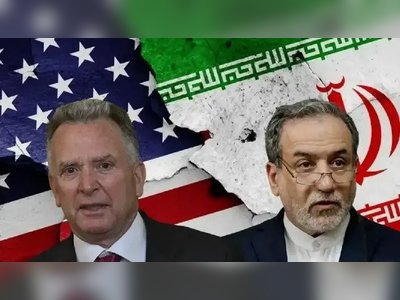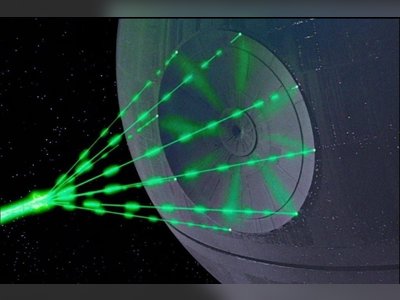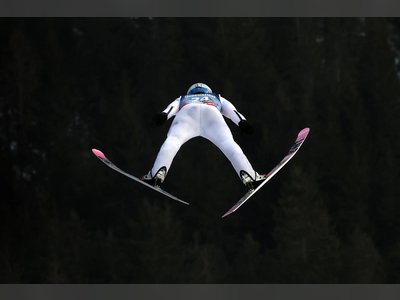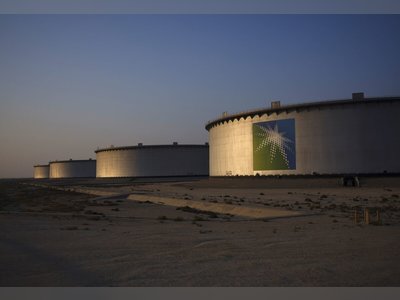
Iran nuclear talks head into deep freeze ahead of midterms
The negotiations to restore the nuclear deal Trump shattered looked to be heading in a good direction. But new demands from Tehran have put it on ice.
The Iran nuclear talks are stalling out again.
Only a few short weeks ago, European diplomats were waltzing through the streets of the Austrian capital, optimistic that 16 months of negotiations to revive the Iran nuclear deal had finally achieved a breakthrough.
But an Iranian tough line — and reports of new uranium enrichment to near-weapon levels — have shattered hopes here that a deal will soon be reconstructed.
In suitably understated language, U.N. nuclear watchdog chief Rafael Grossi revealed his disappointment to reporters on Monday in Vienna: “Engagement with Iran is not at the point that I would really like it to see.”
The indirect negotiations between the U.S, Iran and other world powers are aimed at restoring the 2015 landmark nuclear accord, which lifted many international sanctions on Iran in exchange for strict restrictions on its nuclear program. The deal has been on life support since 2018, when then-President Donald Trump unilaterally walked away from the agreement and reimposed a broad array of sanctions.
In mid-August, it appeared as though Iran was ready to drop a major demand holding up the talks — an explicit guarantee that the U.N. nuclear watchdog probe into its past nuclear activities would be summarily closed. European as well as U.S. diplomats considered the apparent resolution of the issue as a hopeful sign that Iran was ready to close the deal.
But negotiations have faltered again since the beginning of September, when Iran reopened the issue of the probe and asked for further guarantees that would secure Tehran economic benefits of a new deal. Talks now appear headed toward a stalemate until after the U.S. midterm elections on Nov. 8, according to European diplomats.
“This is the most likely scenario,” one senior European diplomat said.
The diplomat also said that, for now, further negotiations over a draft agreement “are over.” The U.S. response to Iran’s latest demands, which is still expected, is thus unlikely to prompt more changes to the document.
Under U.S. legislation, Congress must get a vote on any new agreement with Iran after a 30-day review period. In the midst of a heated election campaign in Washington, choosing to undertake such a controversial vote and debate is highly unlikely, according to European diplomats.
In its most recent feedback on the latest proposal, dated Sept. 1, Tehran doubled down on its request for a guarantee that the investigation into the origin of nuclear traces found at three locations in Iran be closed prior to the so-called reimplementation day — which would take place 120 days after a new deal is signed.
Washington and its European partners have categorically refused this demand, maintaining that the investigation will only be closed once the International Atomic Energy Agency confirms that it has received explanations from Iran that are “technically credible.”
Western countries have tried to keep the investigation separate from the nuclear deal and are reluctant to link the two issues. They believe that the nuclear traces could be proof that Iran had a secret nuclear weapons program that ran until approximately 2003.
“In past weeks, we’ve closed some gaps. Iran has moved away from some extraneous demands — demands unrelated to the JCPOA itself,” U.S. Secretary of State Antony Blinken said in Brussels last week. “However, the latest response takes us backwards. And we’re not about to agree to a deal that doesn’t meet our bottom-line requirements. ... If we conclude a deal, it’s only because it will advance our national security.”
In its latest confidential report on the matter, circulated to member states last week and seen by POLITICO, the IAEA says that “Iran has not engaged with the Agency” on the probe. “Consequently, there have been no developments in this reporting period and no one of the outstanding issues have been resolved,” the report reads.
Behruz Kamalvandi, a top official of Iran’s atomic energy organization, was quoted by Fars news agency as describing the IAEA report as a repetition of the previous baseless accusations with “political purposes.”
Asked about this at Monday’s press conference, Grossi said that he “regrets” this but that the accusation is “nothing new.”
“This issue is very straightforward. We found traces of uranium at places that were never declared and that were never supposed to have any nuclear activity, and we are asking questions,” said the IAEA director general. “Explain to me why this is a political use of my authority? This is what the IAEA is supposed to do.”
Grossi confirmed to POLITICO that currently there are no planned high-level meetings between the IAEA and Iran to discuss the probe.
France, Germany and the United Kingdom — the three European powers that are party to the 2015 nuclear deal — issued a joint statement on Friday, equally expressing their frustration with the situation.
“This latest demand raises serious doubts as to Iran’s intentions and commitment to a successful outcome on the JCPOA,” the three countries said, referring to the official name of the deal, the Joint Comprehensive Plan of Action.
The senior Western diplomat said that the IAEA Board of Governors, which is meeting in Vienna this week, will likely not pass another resolution criticizing Iran for its lack of cooperation. But the issue will certainly be debated by the Board, the diplomat added.
Meanwhile, Iran’s nuclear program continues to grow.
In a second confidential report sent to member states last week, the U.N. nuclear watchdog estimated that Iran had 55.6 kilograms of uranium enriched up to 60 percent, an increase of 12.5 kilograms since May.
Enrichment to 60 percent fissile purity can be converted easily into weapons-grade 90 percent. Experts say that Iran’s current stockpile of 60 percent enriched uranium is sufficient for one nuclear bomb, if enriched further. Building an actual weapon, however, requires additional steps and time, as well as a decision by the Iranian regime to do so.
The IAEA report, seen by POLITICO, also says that Iran’s total stockpile of enriched uranium has grown to 3940.9 kilograms, an increase of 131.6 kilograms since May.
Under the original 2015 nuclear deal, Iran is allowed to enrich uranium to at 3.67 percent — sufficient for medical purposes — and its total stockpile cannot exceed 300 kilograms.
Iran has also dramatically enhanced its use of advanced centrifuges, which are all banned under the original 2015 nuclear deal.
In its report, the agency said that Iran’s removal of IAEA cameras in June poses “considerable challenges” to inspectors to “confirm the consistency of Iran’s declared inventory of centrifuges.”
In other words, the agency has issued a clear warning that it may not be able to determine exactly how many centrifuges Iran has spinning — even if the footage of the cameras is returned to the agency and Iran cooperates with the IAEA under a restored nuclear deal.
“Iran’s decision to remove all of the Agency’s equipment previously installed in Iran for surveillance and monitoring activities in relation to the JCPOA has also had detrimental implications for the Agency’s ability to provide assurance of the peaceful nature of Iran’s nuclear programme,” the report concludes.
Iran has long maintained that its nuclear program is solely for peaceful purposes.
Only a few short weeks ago, European diplomats were waltzing through the streets of the Austrian capital, optimistic that 16 months of negotiations to revive the Iran nuclear deal had finally achieved a breakthrough.
But an Iranian tough line — and reports of new uranium enrichment to near-weapon levels — have shattered hopes here that a deal will soon be reconstructed.
In suitably understated language, U.N. nuclear watchdog chief Rafael Grossi revealed his disappointment to reporters on Monday in Vienna: “Engagement with Iran is not at the point that I would really like it to see.”
The indirect negotiations between the U.S, Iran and other world powers are aimed at restoring the 2015 landmark nuclear accord, which lifted many international sanctions on Iran in exchange for strict restrictions on its nuclear program. The deal has been on life support since 2018, when then-President Donald Trump unilaterally walked away from the agreement and reimposed a broad array of sanctions.
In mid-August, it appeared as though Iran was ready to drop a major demand holding up the talks — an explicit guarantee that the U.N. nuclear watchdog probe into its past nuclear activities would be summarily closed. European as well as U.S. diplomats considered the apparent resolution of the issue as a hopeful sign that Iran was ready to close the deal.
But negotiations have faltered again since the beginning of September, when Iran reopened the issue of the probe and asked for further guarantees that would secure Tehran economic benefits of a new deal. Talks now appear headed toward a stalemate until after the U.S. midterm elections on Nov. 8, according to European diplomats.
“This is the most likely scenario,” one senior European diplomat said.
The diplomat also said that, for now, further negotiations over a draft agreement “are over.” The U.S. response to Iran’s latest demands, which is still expected, is thus unlikely to prompt more changes to the document.
Under U.S. legislation, Congress must get a vote on any new agreement with Iran after a 30-day review period. In the midst of a heated election campaign in Washington, choosing to undertake such a controversial vote and debate is highly unlikely, according to European diplomats.
In its most recent feedback on the latest proposal, dated Sept. 1, Tehran doubled down on its request for a guarantee that the investigation into the origin of nuclear traces found at three locations in Iran be closed prior to the so-called reimplementation day — which would take place 120 days after a new deal is signed.
Washington and its European partners have categorically refused this demand, maintaining that the investigation will only be closed once the International Atomic Energy Agency confirms that it has received explanations from Iran that are “technically credible.”
Western countries have tried to keep the investigation separate from the nuclear deal and are reluctant to link the two issues. They believe that the nuclear traces could be proof that Iran had a secret nuclear weapons program that ran until approximately 2003.
“In past weeks, we’ve closed some gaps. Iran has moved away from some extraneous demands — demands unrelated to the JCPOA itself,” U.S. Secretary of State Antony Blinken said in Brussels last week. “However, the latest response takes us backwards. And we’re not about to agree to a deal that doesn’t meet our bottom-line requirements. ... If we conclude a deal, it’s only because it will advance our national security.”
In its latest confidential report on the matter, circulated to member states last week and seen by POLITICO, the IAEA says that “Iran has not engaged with the Agency” on the probe. “Consequently, there have been no developments in this reporting period and no one of the outstanding issues have been resolved,” the report reads.
Behruz Kamalvandi, a top official of Iran’s atomic energy organization, was quoted by Fars news agency as describing the IAEA report as a repetition of the previous baseless accusations with “political purposes.”
Asked about this at Monday’s press conference, Grossi said that he “regrets” this but that the accusation is “nothing new.”
“This issue is very straightforward. We found traces of uranium at places that were never declared and that were never supposed to have any nuclear activity, and we are asking questions,” said the IAEA director general. “Explain to me why this is a political use of my authority? This is what the IAEA is supposed to do.”
Grossi confirmed to POLITICO that currently there are no planned high-level meetings between the IAEA and Iran to discuss the probe.
France, Germany and the United Kingdom — the three European powers that are party to the 2015 nuclear deal — issued a joint statement on Friday, equally expressing their frustration with the situation.
“This latest demand raises serious doubts as to Iran’s intentions and commitment to a successful outcome on the JCPOA,” the three countries said, referring to the official name of the deal, the Joint Comprehensive Plan of Action.
The senior Western diplomat said that the IAEA Board of Governors, which is meeting in Vienna this week, will likely not pass another resolution criticizing Iran for its lack of cooperation. But the issue will certainly be debated by the Board, the diplomat added.
Meanwhile, Iran’s nuclear program continues to grow.
In a second confidential report sent to member states last week, the U.N. nuclear watchdog estimated that Iran had 55.6 kilograms of uranium enriched up to 60 percent, an increase of 12.5 kilograms since May.
Enrichment to 60 percent fissile purity can be converted easily into weapons-grade 90 percent. Experts say that Iran’s current stockpile of 60 percent enriched uranium is sufficient for one nuclear bomb, if enriched further. Building an actual weapon, however, requires additional steps and time, as well as a decision by the Iranian regime to do so.
The IAEA report, seen by POLITICO, also says that Iran’s total stockpile of enriched uranium has grown to 3940.9 kilograms, an increase of 131.6 kilograms since May.
Under the original 2015 nuclear deal, Iran is allowed to enrich uranium to at 3.67 percent — sufficient for medical purposes — and its total stockpile cannot exceed 300 kilograms.
Iran has also dramatically enhanced its use of advanced centrifuges, which are all banned under the original 2015 nuclear deal.
In its report, the agency said that Iran’s removal of IAEA cameras in June poses “considerable challenges” to inspectors to “confirm the consistency of Iran’s declared inventory of centrifuges.”
In other words, the agency has issued a clear warning that it may not be able to determine exactly how many centrifuges Iran has spinning — even if the footage of the cameras is returned to the agency and Iran cooperates with the IAEA under a restored nuclear deal.
“Iran’s decision to remove all of the Agency’s equipment previously installed in Iran for surveillance and monitoring activities in relation to the JCPOA has also had detrimental implications for the Agency’s ability to provide assurance of the peaceful nature of Iran’s nuclear programme,” the report concludes.
Iran has long maintained that its nuclear program is solely for peaceful purposes.
